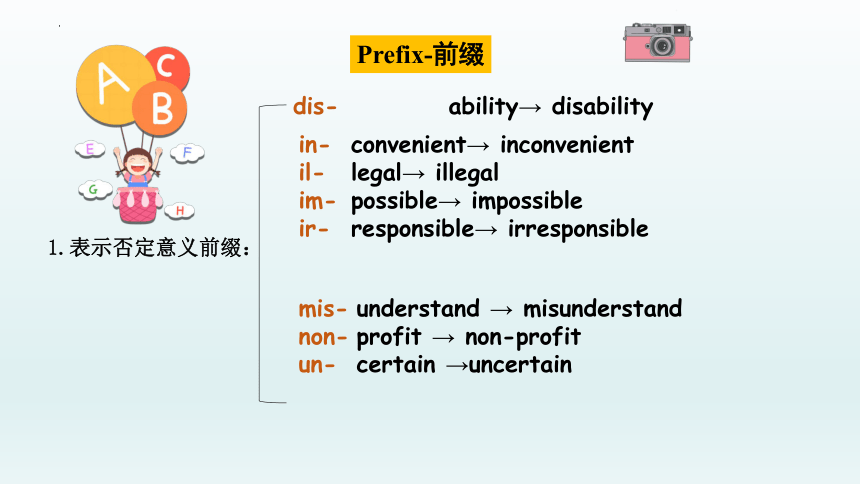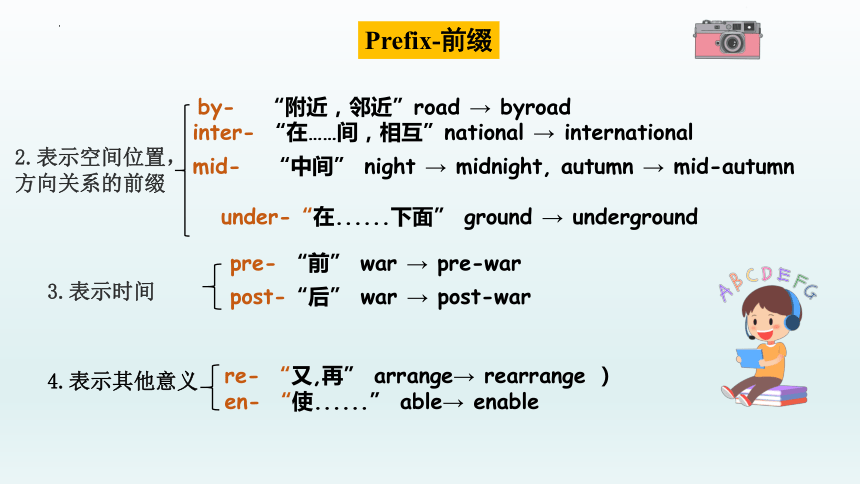外研版(2019)必修第一册Unit 2 Exploring English Using language构词法课件(共34张PPT,内嵌音频)
文档属性
| 名称 | 外研版(2019)必修第一册Unit 2 Exploring English Using language构词法课件(共34张PPT,内嵌音频) |  | |
| 格式 | pptx | ||
| 文件大小 | 12.8MB | ||
| 资源类型 | 教案 | ||
| 版本资源 | 外研版(2019) | ||
| 科目 | 英语 | ||
| 更新时间 | 2024-09-09 16:19:41 | ||
图片预览












文档简介
(共34张PPT)
Period 2 Using language
Unit 2 Exploring English
英语中的构词法主要有
缩略法(abbreviating)
转化法(changing the part of speech)
派生法(adding a prefix or suffix )
合成法 (combining two or more words )
Word formation 构词法: 是单词构成的基本规律,按照一定的语言规律创造新词的方法叫做构词法。
Review: word formation
abbreviating (缩略)
A word formed from the first letters of the words that make up the name of sth.
(缩略法,即将单词缩写,词义和词性保持不变)
World Health Organization→ WHO
Information Technology→ IT
telephone→phone
aeroplane→plane
2.截头缩略
1.首字母缩略
examination→exam
laboratory→lab
3.去尾缩略
Very Important Person
Chief Executive Officer
China Central Television
World Trade Organization
Virtual Reality
VIP
CEO
CCTV
WTO
VR
change the part of speech(词性)(改变单词的词性)
Conversion(转化)
(1)动词 名词
Look at me.
Let me have a look.
(2)名词 动词
Open your book.
I must book the ticket.
(3)形容词 动词
Our classroom is very clean.
We clean our classroom every day.
(4)形容词 名词
(意义改变)
You are right.
Citizens have the right to speak freely.
请大家判断词性转化类型,然后翻译句子
(1) Let me have a try.
(2) You could shoulder the task.
(3) You should try your best to better your performance.
(4)They are discussing the content of the story.
v.-n.
让我来试一试。
n.-v.
你可以承担这项任务。
adj.-v.
你应该尽最大努力让自己有更好的表现。
adj.-n.
他们正在讨论这个故事的内容。
【即学即练】
Derivation 派生
by adding a prefix or (and) a suffix (在词根上加上前、后缀构成另外一个词)
unemployment
单词=
前缀
词根
后缀
改变词义
词的本意
改变词性
Prefix-前缀
1.表示否定的前缀:
dis-
il-
im-
ir-
in-
un-
2.表示空间位置,方向的前缀 :
by-
inter-
mid-
under-
3.表示比较程度差别关系的前缀:
extra-
over-
super-
under
…
4.表示时间的前缀:
ex-
fore
mid-
post-
5.表示重复的前缀:
re-
6.表示动化的前缀:
en-
1.表示否定意义前缀:
Prefix-前缀
dis-
in-
il-
im-
ir-
mis-
non-
un-
convenient→ inconvenient
legal→ illegal
possible→ impossible
responsible→ irresponsible
ability→ disability
understand → misunderstand
profit → non-profit
certain →uncertain
Prefix-前缀
by- “附近,邻近”road → byroad
under-“在......下面” ground → underground
inter- “在……间,相互”national → international
mid- “中间” night → midnight, autumn → mid-autumn
re- “又,再” arrange→ rearrange )
en- “使......” able→ enable
pre- “前” war → pre-war
post-“后” war → post-war
2.表示空间位置,
方向关系的前缀
4.表示其他意义
3.表示时间
Suffix-后缀
名词后缀
形容词后缀
动词后缀
副词后缀
Suffix-后缀
1.表示人的名词后缀
-er: begin → beginner(初学者)
-or: act → actor(演员)
-ee: employ → employee(雇员)
-ist: art→ artist (艺术家)
-ian: music→ musician(音乐家)
-ant: assist→ assistant (助手)
-ess: god→ goddess (女神)
-ness: careless → carelessness(粗心)
-ment: achieve→ achievement (成就)
-dom: free→ freedom(自由)
-tion: invent→ invention (发明)
-ance: accept→ acceptance (接受)
-ence: depend→ dependence (依赖)
-ion: express→ expression (表达)
-ty: possible→ possibility (可能性)
2.其他名词后缀
Suffix-后缀
3. 形容词后缀
-al: nation→ national (民族的)
-(i)ous: danger→ dangerous (危险的)
-ful: success→ successful (成功的)
-less: pain→ painless (不痛苦的)
-some: trouble→ troublesome (有麻烦的)
-ial: influence→ influential (有影响力的)
-able: avoid →avoidable(可避免的)
-tive: attract→ attractive (有吸引力的)
4. 动词后缀
-en: sharp →sharpen(使尖锐)
-fy: simple → simplify (使简化)
-ize: modern→ modernize (使现代化)
5. 副词后缀
-ly: easy →easily(容易地)
-s: indoor→ indoors (在室内)
-ward(s): toward(趋向)
Compounding(合成)
create a new word by compounding two or more existing words
(由两个或更多的词合成一个词)
+
=
+
=
(1) n.+n.: air conditioner (空调);blood pressure(血压)
(2) adj. + n.:central bank (中央银行);fast food(快餐)
(3) v-ing. + n.:washing machine (洗衣机);driving license(驾驶证)
(4) n. + v-ing. :story-telling(讲故事);hand-writing(笔迹)
(5) adv. + v.:outbreak(爆发);output(产量)
(6) v. + adv.:breakdown(故障);feedback(反馈)
1.合成名词
2.合成形容词
(1)词尾为过去分词或+ed: absent-minded(心不在焉的);hand-made(手工的)
(2)词尾为现在分词:good-looking(好看的);easy-going(随和的)
(3)词尾为形容词:duty-free(免税的);homesick (想家的)
3.合成动词
overcome(战胜)undergo(经历)
4.合成副词
whole-heartedly (全心全意地);
downstairs(在楼下)
Summary
Word formation
合成法
转换法
派生法
缩略法
两个词合成一个新词。
词形不变,词性改变。
在词根上加上前、后缀构成另外一个词。
用单词首尾字母组成一个新词。
1. Look at the sentences and expressions from the reading passage. Match the words in bold to the types of word formation.
a Neither is there pine nor apple in pineapple.
b … sculpt a sculpture…
c When we… see rain…, we can say “it’s raining”…
d WHO
1 abbreviating
2 changing the part of speech
3 adding a prefix or suffix
4 combining two or more words
b
d
c
a
Complete the passage with the help of word formation.
When you open a dictionary, you often come across a lot of unfamiliar words. You might think this is a bit scary. But many of them are formed using other simpler words. This is called word formation.
Words formed by combining other words are called compounds, for example, 1__________ (a friend that you contact by writing, traditionally using a pen) and 2__________ (known by many people).
Prefixes and suffixes often have fixed meanings. If you add un- or in- to a word, the new word usually means the opposite. For example, if something isn’t correct it’s 3__________, and if someone isn’t happy they’re 4__________. Words with the suffixes -ment and -ness are often nouns. For example, if somebody has improved a lot, they have made great 5____________.
penfriend
well-known
incorrect
unhappy
improvement
Complete the passage with the help of word formation.
Some nouns and adjectives can be used as verbs, or the other way round. When we calm somebody down, they become 6__________. And we can give someone a present by 7__________ it.
And sometimes a word is made up of the first letters of several words: “World Trade Organization” can be referred to as 8__________, and 9__________ is short for “as soon as possible”.
It is impossible to know the meaning of every word, but knowing about word formation can help us guess their meanings.
calm
presenting
WTO
ASAP
American and British English
theatre
theater
gas
highway
petrol
motorway
elevator
lift
subway
underground
apartment
flat
Let’s listen.
Unfamiliar English expressions
Before-listening
While-listening
Conversation 1 --- b
Conversation 2 --- c
Conversation 3 --- a
Listen to three conversations and match them to the pictures.
Listen to the conversation 1 again and choose the right answer.
1. What did the speaker order
A dim sum B spring rolls C meat ball
2. What king of food is dim sum?
A western food B traditional Chinese food C popular new food
3. Where does the word “dim sum” come from?
A Guangdong dialect B Mandarin C Putonghua
1. What happened during the movie
A someone ate food loudly
B someone cried loudly
C someone talked loudly on the phone
2. What did they think of “taking loudly during the movie“?
A No matter B Selfish C Common
3. Which two words make up(组成) the word “cellfish”?
A cellphone; selfish B cell; fish
Listen to the conversation 2 again and choose the right answer.
1. What was the women's trouble
A She could't talk.
B She did't undertand Lucy's message.
C She missed Lucy .
2. What did Lucy replied after hearing the joke?
A LOL B BTW C BBL
3. Which is LOL for?
A a short way of saying”laugh out loudly”
B a short way of saying “ speak out loudly”
C a short way of saying “ speak out loudly
Listen to the conversation 3 again and choose the right answer.
Unfamiliar English expressions
Listen again and complte the table.
Words Meaning Origin
dim sum a kind of traditional 1_____________ from 2_____________________
3__________ using a cellphone without caring about others a combination of the words 4__________ ad 5_________
6__________ a shorter way of saying 7___________________ from the Internet
LOL
Chinese food
the Guangdong dialect
cellfish
cellphone
selfish
“laugh out loud”
Thank you!
Challenge
yourself!
rain(形容词) ________ agree(反义)__________
nation(形容词)_______ farm(人)__________
recent(副词)________ friend(形容词)________
hope(形容词)_______ job(形容词)_________
visit(名词)__________ access(形容词) ________
eight(八十)________ true(名词)___________
kind(名词)_______ China(形容词)________
1. 按括号内的要求改写下列单词
rainy
national
recently
hopeful
visitor
eighty
kindness
disagree
farmer
friendly
jobless
accessible
truth
Chinese
Exercise
2.用括号中所给单词的正确形式填空:
1.Harry Potter is a boy who is full of ____________(imagine).
2.______________ (congratulate)! You have done so well in the game.
3. I received a letter of __________ (invite) but I didn’t accept it.
4. His late _________(arrive) made a mess of our plan.
5. To the ___________(amaze) of the parents, their child can look after himself without their help.
6. He did exercise to ___________ (strong) his muscles.
7. I went out to _______( breath) the fresh air.
imagination
Congratulations
invitation
arrival
amazement
strengthen
breathe
8. They also shared with us many __________ (tradition) stories about Hawaii that were ________(huge) popular with tourists.
9. We are so proud of her. It's ____________ (wonder).
10.All the football _________(play) on the playground cheered loudly.
traditional
hugely
wonderful
players
1. After I had pictured it over and over again
in my mind, the big day finally arrived.
2. As a nature photographer, I have to brave
the elements.
3. Translate the sentences:
Period 2 Using language
Unit 2 Exploring English
英语中的构词法主要有
缩略法(abbreviating)
转化法(changing the part of speech)
派生法(adding a prefix or suffix )
合成法 (combining two or more words )
Word formation 构词法: 是单词构成的基本规律,按照一定的语言规律创造新词的方法叫做构词法。
Review: word formation
abbreviating (缩略)
A word formed from the first letters of the words that make up the name of sth.
(缩略法,即将单词缩写,词义和词性保持不变)
World Health Organization→ WHO
Information Technology→ IT
telephone→phone
aeroplane→plane
2.截头缩略
1.首字母缩略
examination→exam
laboratory→lab
3.去尾缩略
Very Important Person
Chief Executive Officer
China Central Television
World Trade Organization
Virtual Reality
VIP
CEO
CCTV
WTO
VR
change the part of speech(词性)(改变单词的词性)
Conversion(转化)
(1)动词 名词
Look at me.
Let me have a look.
(2)名词 动词
Open your book.
I must book the ticket.
(3)形容词 动词
Our classroom is very clean.
We clean our classroom every day.
(4)形容词 名词
(意义改变)
You are right.
Citizens have the right to speak freely.
请大家判断词性转化类型,然后翻译句子
(1) Let me have a try.
(2) You could shoulder the task.
(3) You should try your best to better your performance.
(4)They are discussing the content of the story.
v.-n.
让我来试一试。
n.-v.
你可以承担这项任务。
adj.-v.
你应该尽最大努力让自己有更好的表现。
adj.-n.
他们正在讨论这个故事的内容。
【即学即练】
Derivation 派生
by adding a prefix or (and) a suffix (在词根上加上前、后缀构成另外一个词)
unemployment
单词=
前缀
词根
后缀
改变词义
词的本意
改变词性
Prefix-前缀
1.表示否定的前缀:
dis-
il-
im-
ir-
in-
un-
2.表示空间位置,方向的前缀 :
by-
inter-
mid-
under-
3.表示比较程度差别关系的前缀:
extra-
over-
super-
under
…
4.表示时间的前缀:
ex-
fore
mid-
post-
5.表示重复的前缀:
re-
6.表示动化的前缀:
en-
1.表示否定意义前缀:
Prefix-前缀
dis-
in-
il-
im-
ir-
mis-
non-
un-
convenient→ inconvenient
legal→ illegal
possible→ impossible
responsible→ irresponsible
ability→ disability
understand → misunderstand
profit → non-profit
certain →uncertain
Prefix-前缀
by- “附近,邻近”road → byroad
under-“在......下面” ground → underground
inter- “在……间,相互”national → international
mid- “中间” night → midnight, autumn → mid-autumn
re- “又,再” arrange→ rearrange )
en- “使......” able→ enable
pre- “前” war → pre-war
post-“后” war → post-war
2.表示空间位置,
方向关系的前缀
4.表示其他意义
3.表示时间
Suffix-后缀
名词后缀
形容词后缀
动词后缀
副词后缀
Suffix-后缀
1.表示人的名词后缀
-er: begin → beginner(初学者)
-or: act → actor(演员)
-ee: employ → employee(雇员)
-ist: art→ artist (艺术家)
-ian: music→ musician(音乐家)
-ant: assist→ assistant (助手)
-ess: god→ goddess (女神)
-ness: careless → carelessness(粗心)
-ment: achieve→ achievement (成就)
-dom: free→ freedom(自由)
-tion: invent→ invention (发明)
-ance: accept→ acceptance (接受)
-ence: depend→ dependence (依赖)
-ion: express→ expression (表达)
-ty: possible→ possibility (可能性)
2.其他名词后缀
Suffix-后缀
3. 形容词后缀
-al: nation→ national (民族的)
-(i)ous: danger→ dangerous (危险的)
-ful: success→ successful (成功的)
-less: pain→ painless (不痛苦的)
-some: trouble→ troublesome (有麻烦的)
-ial: influence→ influential (有影响力的)
-able: avoid →avoidable(可避免的)
-tive: attract→ attractive (有吸引力的)
4. 动词后缀
-en: sharp →sharpen(使尖锐)
-fy: simple → simplify (使简化)
-ize: modern→ modernize (使现代化)
5. 副词后缀
-ly: easy →easily(容易地)
-s: indoor→ indoors (在室内)
-ward(s): toward(趋向)
Compounding(合成)
create a new word by compounding two or more existing words
(由两个或更多的词合成一个词)
+
=
+
=
(1) n.+n.: air conditioner (空调);blood pressure(血压)
(2) adj. + n.:central bank (中央银行);fast food(快餐)
(3) v-ing. + n.:washing machine (洗衣机);driving license(驾驶证)
(4) n. + v-ing. :story-telling(讲故事);hand-writing(笔迹)
(5) adv. + v.:outbreak(爆发);output(产量)
(6) v. + adv.:breakdown(故障);feedback(反馈)
1.合成名词
2.合成形容词
(1)词尾为过去分词或+ed: absent-minded(心不在焉的);hand-made(手工的)
(2)词尾为现在分词:good-looking(好看的);easy-going(随和的)
(3)词尾为形容词:duty-free(免税的);homesick (想家的)
3.合成动词
overcome(战胜)undergo(经历)
4.合成副词
whole-heartedly (全心全意地);
downstairs(在楼下)
Summary
Word formation
合成法
转换法
派生法
缩略法
两个词合成一个新词。
词形不变,词性改变。
在词根上加上前、后缀构成另外一个词。
用单词首尾字母组成一个新词。
1. Look at the sentences and expressions from the reading passage. Match the words in bold to the types of word formation.
a Neither is there pine nor apple in pineapple.
b … sculpt a sculpture…
c When we… see rain…, we can say “it’s raining”…
d WHO
1 abbreviating
2 changing the part of speech
3 adding a prefix or suffix
4 combining two or more words
b
d
c
a
Complete the passage with the help of word formation.
When you open a dictionary, you often come across a lot of unfamiliar words. You might think this is a bit scary. But many of them are formed using other simpler words. This is called word formation.
Words formed by combining other words are called compounds, for example, 1__________ (a friend that you contact by writing, traditionally using a pen) and 2__________ (known by many people).
Prefixes and suffixes often have fixed meanings. If you add un- or in- to a word, the new word usually means the opposite. For example, if something isn’t correct it’s 3__________, and if someone isn’t happy they’re 4__________. Words with the suffixes -ment and -ness are often nouns. For example, if somebody has improved a lot, they have made great 5____________.
penfriend
well-known
incorrect
unhappy
improvement
Complete the passage with the help of word formation.
Some nouns and adjectives can be used as verbs, or the other way round. When we calm somebody down, they become 6__________. And we can give someone a present by 7__________ it.
And sometimes a word is made up of the first letters of several words: “World Trade Organization” can be referred to as 8__________, and 9__________ is short for “as soon as possible”.
It is impossible to know the meaning of every word, but knowing about word formation can help us guess their meanings.
calm
presenting
WTO
ASAP
American and British English
theatre
theater
gas
highway
petrol
motorway
elevator
lift
subway
underground
apartment
flat
Let’s listen.
Unfamiliar English expressions
Before-listening
While-listening
Conversation 1 --- b
Conversation 2 --- c
Conversation 3 --- a
Listen to three conversations and match them to the pictures.
Listen to the conversation 1 again and choose the right answer.
1. What did the speaker order
A dim sum B spring rolls C meat ball
2. What king of food is dim sum?
A western food B traditional Chinese food C popular new food
3. Where does the word “dim sum” come from?
A Guangdong dialect B Mandarin C Putonghua
1. What happened during the movie
A someone ate food loudly
B someone cried loudly
C someone talked loudly on the phone
2. What did they think of “taking loudly during the movie“?
A No matter B Selfish C Common
3. Which two words make up(组成) the word “cellfish”?
A cellphone; selfish B cell; fish
Listen to the conversation 2 again and choose the right answer.
1. What was the women's trouble
A She could't talk.
B She did't undertand Lucy's message.
C She missed Lucy .
2. What did Lucy replied after hearing the joke?
A LOL B BTW C BBL
3. Which is LOL for?
A a short way of saying”laugh out loudly”
B a short way of saying “ speak out loudly”
C a short way of saying “ speak out loudly
Listen to the conversation 3 again and choose the right answer.
Unfamiliar English expressions
Listen again and complte the table.
Words Meaning Origin
dim sum a kind of traditional 1_____________ from 2_____________________
3__________ using a cellphone without caring about others a combination of the words 4__________ ad 5_________
6__________ a shorter way of saying 7___________________ from the Internet
LOL
Chinese food
the Guangdong dialect
cellfish
cellphone
selfish
“laugh out loud”
Thank you!
Challenge
yourself!
rain(形容词) ________ agree(反义)__________
nation(形容词)_______ farm(人)__________
recent(副词)________ friend(形容词)________
hope(形容词)_______ job(形容词)_________
visit(名词)__________ access(形容词) ________
eight(八十)________ true(名词)___________
kind(名词)_______ China(形容词)________
1. 按括号内的要求改写下列单词
rainy
national
recently
hopeful
visitor
eighty
kindness
disagree
farmer
friendly
jobless
accessible
truth
Chinese
Exercise
2.用括号中所给单词的正确形式填空:
1.Harry Potter is a boy who is full of ____________(imagine).
2.______________ (congratulate)! You have done so well in the game.
3. I received a letter of __________ (invite) but I didn’t accept it.
4. His late _________(arrive) made a mess of our plan.
5. To the ___________(amaze) of the parents, their child can look after himself without their help.
6. He did exercise to ___________ (strong) his muscles.
7. I went out to _______( breath) the fresh air.
imagination
Congratulations
invitation
arrival
amazement
strengthen
breathe
8. They also shared with us many __________ (tradition) stories about Hawaii that were ________(huge) popular with tourists.
9. We are so proud of her. It's ____________ (wonder).
10.All the football _________(play) on the playground cheered loudly.
traditional
hugely
wonderful
players
1. After I had pictured it over and over again
in my mind, the big day finally arrived.
2. As a nature photographer, I have to brave
the elements.
3. Translate the sentences:
